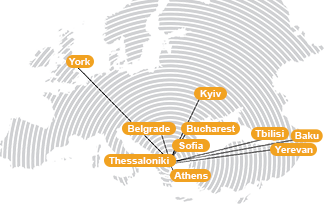CONTEXT:
The creative and cultural sectors represent more than 7 million jobs in the EU and account for 4.2% of the EU's GDP (EY, 2017) generating an added value of approx. 517 billion EUR. In the European Parliament resolution on a new skills agenda for Europe (2017/2002(INI)), creative & cultural entrepreneurship (CCE) is explicitly mentioned as contributing to social well-being, innovation, employment and as stimulating the EU’s economic development. CCE is deemed to innovate the traditional outdated startups with new models, new practices and new governance structures in which the role of society will be enhanced in order to boost social inclusion by mitigating groups at risk and creating new job opportunities. CCE brings direct added value to promoting culture, cities, places and thus tourism, with an imminent impact on active citizenship and inclusive societies (Abbing, 2016). Nevertheless, there is limited evidence of emphasis being put on CCE in Europe overall (EC, 2018). Higher education institutions (HEIs) are playing a key role in shaping the next generation of CCE by providing the necessary training aimed at building the proper skills of potential cultural & creative entrepreneurs to achieve a proper startup & scaleup with their idea (and not be limited only to the startup stage). This is of critical importance within the EU as the majority of startups do not achieve a proper scale-up stage and this is widely due to lack of proper training to access the required resources and networks that would ensure the scaleup. As entrepreneurship is a very dynamic field, HEI teachers & trainers are required to always co-create (transnationally) with entrepreneurs, mentors, investors, policy makers and society in order to ensure that their curricula are infused with the proper knowledge that would ensure the success of their graduates (Chesbrough, 2016). At this stage, in the field of CCE, such co-creation (envisioned through IO2, C1, C2) is widely absent – justifying, firstly, the limited CCE course offerings (hence the need for IO1) within European HEIs, and secondly, the lack of effectiveness of the existing (few) courses in terms of yielding successful CCE.
NEEDS ANALYSIS:
ROMANIA: Entrepreneurial behaviour; teamwork; decision making; design thinking; business planning; income generation; digital skills; national & international networking (primary data collection with CCE stakeholders, Timisoara Cultural Strategy 2014-2024, TM2021, 2014). WUT & UPT are lacking the skills to deliver an integrated CCE course. Both SEERC & SIG already have such entrepreneurial expertise and could help WUT & UPT to achieve their goals. On top of this, MUNTM’s goal is to capitalize on Timisoara’s abilities to deliver a very successful European Capital of Culture 2021 project while also maintaining it in a sustainable manner afterwards and TraCCE is the solution to this end.
AUSTRIA: In comparison to the EU the general rate of founding new businesses is below average due to a lack of academic entrepreneurial education on all levels. Special CCE programs are run by the Austrian Creative Industries, however the higher education sector is substantially lacking such training provisions (WKo, 2018). SIG's current target is to be able to offer CCE training at the higher education level i.e. going beyond VET). SEERC has this co-creation capacity, and therefore, the transnational cooperation will contribute to this joint mission.
GREECE: CCE ideation, grant bidding, business planning, budgeting, digitalisation, intercultural skills, accountability (Hyz and Karamanis, 2016; Giakoulas, 2016). Only two centralised academic CCE training endeavours are provided in Greece by the British Council and the Goethe Institute. While SEERC’s founder is already delivering BSc/Msc/MBA programmes on Innovation & Entrepreneurship, they are currently keen on introducing a new programme on CCE that would cover the entire Eastern European region. The institution does not have considerable experience at the moment on CCE, and therefore, the role of transnational cooperation is critical.
GERMANY: Need for CCE training in higher education under conditions of an ageing society losing connection with technology-based development in the competitive global economy. There is a severe lack of focus specifically on CCE - training & course provision (Stuetzer et al., 2018). On top of this, MUAS aims at achieving its internationalization targets through transnational cooperation on CCE by sharing best practices and infusing their local ecosystem with international CCE.
OBJECTIVES:
TraCCE adopts a transnational & multi-stakeholder approach in order to co-create: a higher education CCE Curriculum (IO1) and a CCE Train the Trainers Toolkit (IO4) that will be offered to higher education staff, students and the CCE community (open access) through a virtual learning environment (IO3) and through two international workshops (C1, C2).





